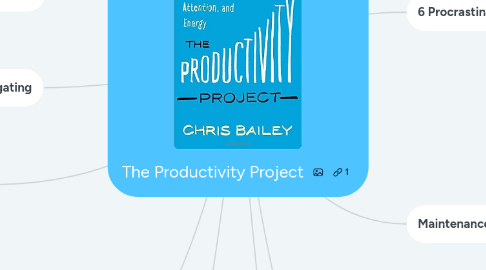
1. Working more does not make you more effective
1.1. By controlling how much time you spend on a task, you control how much energy and attention you spend on it.
1.2. Learn to invest more energy and attention into your work, so you can get the same amount done in a fraction of the time.
1.3. After 35-40 hours your productivity begins to plummet
2. Biological Prime Time
2.1. Find out during which periods on the day you are most productive and use that optimally
2.2. Work on your most important and meaningful tasks when you have the most energy, not when you have the most time!
3. Outsourcing/delegating
3.1. Don't waste time on trivial things
3.2. Let others do the less important stuff
4. Internet
4.1. Internet kills your productivity
4.2. Turn it off when you need to be productive
5. Quiet your mind
5.1. Brain dump
5.1.1. Wating For list
5.1.2. Worry list
5.1.3. Inbox review
5.1.4. Hot spots list
5.2. Making room
5.2.1. two brain modes
5.2.1.1. Wandering mode
5.2.1.2. Central executive mode
5.2.2. Use the wandering mode
5.2.2.1. Exercising
5.2.2.2. Reading
5.2.2.3. Meditation
5.2.2.4. Listening music
5.2.2.5. Praying
5.2.2.6. Going for a nature walk
5.2.2.7. Spending time with friends
5.2.2.8. Going for a massage
6. Next level
6.1. Eat healthy
6.2. Drinking for energy
6.3. Exercise
6.4. Sleep
7. Three productivity factors
7.1. Budhist monk vs wall street trader
7.1.1. Energy
7.1.2. Time
7.1.3. Attention
8. Rule of three
8.1. 3 tasks to accomplish today
8.2. 3 things to accomplish this week
9. 6 Procrastination triggers
9.1. Boring
9.2. Difficult
9.3. Frustrating
9.4. Unstructured or Ambiguous
9.5. Lacking in personal meaning
9.6. Lacking in intrinsic rewards
10. Maintenance day
10.1. Use one day for all your maintenance tasks
10.1.1. Grocery shopping
10.1.2. Clean house
10.1.3. Do laundry
10.1.4. Review lists
10.1.5. Clear inbox
10.1.6. Read articles gathered throughout the week
10.1.7. Define three outcomes for the week ahead
10.1.8. Review projects
11. Your attention muscle
11.1. Three parts
11.1.1. Central Executive
11.1.1.1. This is your thinking and planning brain that lives in your prefrontal cortex. So far, particularly in the procrastination section, I’ve done my best to write this book in a way that will fire up this part of your brain. It’s mostly the other two parts of your attention muscle that I’ll focus on in this section.
11.1.2. Focus
11.1.2.1. This involves narrowing your attentional spotlight to focus on the task at hand, which helps you work more efficiently.
11.1.3. Awareness
11.1.3.1. This means becoming aware of what’s going on in your internal and external environments, which helps you work more mindfully and deliberately.
